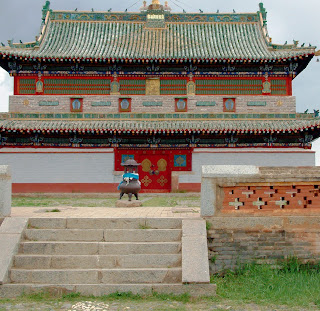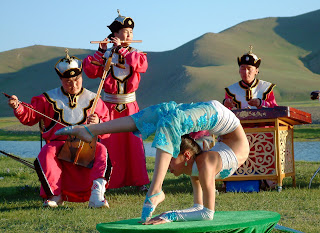PART 3
This is the third and final blog about my National Deaf Children's Society charity bike ride from the Gobi Desert across the Khangai Mountains in Mongolia. The 20 riders and the support crew had established a daily pattern which involved daily briefings and approximately 60km rides through magnificent, remote valleys and hills. Gradually as we travelled north towards the mountains, the climbs got steeper and longer. The wide valleys and steep edges of the Gobi had given way to more mountainous terrain. Long climbs with wonderful views and a sense of achievement at the top, followed by scintillating descents now occupied our days. As we approached the mountains, we started to see trees for the first time on the ride.
I had never been to Mongolia and as expected, there were vast cultural differences between my background and Mongolia and its people. The nomads, whom we seemed to have now left behind, lived off the land with very little input from outside. Such was their understanding and use of biodegradable, natural materials that non-biodegradable stuff, like sweet wrappers or broken bits of motor parts were simply discarded and left to litter the countryside. As a conservationist this, I suppose, evoked equal feelings of admiration and hopelessness. Not unexpectedly, we had several interesting discussions as to the sustainability of this lifestyle. Their children had very little opportunity to do anything in life other than be a nomad. When under Russian rule, each child had to go to school. Now, following independence, this was no longer the case and the children of nomads stayed with their families. It was better under the Russians, someone told me.
Despite the absence of Russian rule since the fall of the USSR in 1991, there was a strong Russian influence in Mongolia, not least in the architecture and the vehicles. In stark contrast, Buddhism is the main religion of which there is much evidence and we saw many monasteries and ovoos (https://en.wikipedia.org/wiki/Ovoo) along the route as well as being hosted by nomads in a ger and served all manner of delightful cheeses and yoghurt made from yak milk!
Traditional ovoos. These Buddhist shrines litter the
Mongolian countryside.
Each night we camped under the stars. One evening just after we'd pitched camp, a howling gale hit us. It came out of nowhere and rattled the vehicles, blew the bikes over, removed anything not tied down and damaged three tents. In a frenzy, we did our best to secure the tattered and broken tents in the rain and wind, at least until things calmed a bit. Then we staggered into the support truck and sought solace in Tiger beers. The massive truck rocked in the wind.
During the evenings, more often than not out of nowhere, locals would appear; on foot, horseback, motor bike and once, by car. They came to say hello, their curiosity piqued about what we were doing and to give us their best wishes. The Mongolian support team acted as our interpreters. Given the alternative culture, it is not surprising that I found many events unexpected. On this particularly stormy evening, astoundingly, the back of the truck opened and three dishevelled young kids catapulted inside, the ferocity of the storm behind them. They had come from up the valley to say hello. The eldest was a boy of 13 and was training to be a Buddhist monk. His sisters were 12 and 7. After a period of exchanging pleasantries we found out that they had walked a fair distance to visit us when they were caught out by the storm. Communication was slow, requiring translation and discussion among the support crew, about correct interpretation. But eventually the three understood what we were doing. When they did understand, in the howling gale and rocking truck, youngest sang us a song and the eldest gave us his Buddhist blessing for safe travels. A trainee or not, five minutes after the blessing, the storm stopped abruptly. All was calm. Take from that what you will. I've tried on numerous occasions back in Britain to use a blessing to remove bad weather but to no avail - I just have not had the adequate training, clearly!
As we approached the end of the trip, I reflected on my diabetic control. All my support mechanisms had been removed and replaced with foreign conditions ranging from new people, increased activity, different food, sleeping conditions and the great unknown. The wide range of my blood sugars wasn't too surprising given these changes (although I did hope that my six months cycle training would have offset this a bit better). But I had no further diary entries about diabetes except at the end of the trip where I wrote that they were under control! With understanding, I recall, from my fellow cyclists.
My tactic was to cycle at the front of the group to get a bit ahead (there were about 5 of us that were a bit fitter than the others). We'd stop after a while at an interesting spot and I'd quickly unpack my glucometer, do a finger prick test with a drop of blood, take whatever action was needed, and pack it all up again before the main group arrived.
Finally, on the issue of diabetes, a reading of 1.9 mmols stuck in my mind. The five of us had a friendly competition up every hill. On day 3, camp was on top of a hill with a long climb. Half way up I went flat out to the top which I reached first. Happily I reached for my glucometer only to see a disappointing 1.9 mmol reading. A quick non-scientific look at the internet indicates that readings of 2.2 mmols are dangerous and a coma can occur at this level! I recovered quickly after eating glucose and applauded everyone as they reached the top.
As we left the Khangai Mountains, the landscape changed
into rolling hills
The final days were spend riding good quality roads.
The final days riding were long but easy. On the second last day we passed the 300km mark and had now traded tracks for a higher quality gravel road across undulating plains of the Mongolian plateau. Blue skies overhead and Karakorum our destination tomorrow!
Ovoos still were common along the route. Here we take
a break on the second last day.
We made a fast time and despite stops for photographs and to complete the customary three revolutions of each ovoo we passed, and there were many, we completed the 80kms in four hours. We camped outside a small village on a grassy plain and played football against the Mongolians. The 2006 FIFA World Cup was taking place in Germany and this was our world cup - Mongolian hosting England. We got hammered by the delighted support team!
This ovoo (on the cliff top) was a spectacular bull. We
did not climb up to do the three circuits!
The final day was as exciting as it was sad. We were all pleased to have completed the ride and good friendships had been established within the group. But we were sad to be ending a magnificent trip. The last ride in Mongolia was short, only 40kms and similar to the previous day, undulating terrain on and good roads. We were going to Karakorum, the ancient capital of Chinggis Khan's vast empire. The town lies in a valley surrounded by hills which offered great defence as the town dwellers could see the dust of any approaching armies.
We road to the top of a surrounding hill and then down into the town. The usual first five or six of us had a final celebratory sprint and then waited for the rest to arrive so we could enter Karakorum as a group.
The end in Karakorum!
Outside the magnificent Erdene Zuu Buddhist Monastery we toasted completion of our 385km trip through the Gobi Desert by riding under a banner of balloons and pausing for a team photo and champagne. The Mongolian support team had again pulled out all the stops to make this a trip of a lifetime! The temple had been destroyed in the 16th century and was rebuilt using salvaged materials. It had been saved from the Stalinist purges by conversion to a museum but today it is an active monastery. We were euphoric as we entered the monastery grounds and marvelled at the architecture. The surrounding wall resembles a Tibetan Buddhist rosary with (possibly) 108 stupas (small Buddhas and108 being a sacred number) The monastery's temple walls are painted and the Chinese-style roof is covered with green tiles.
Traditional Mongolian guide next to the Erdene Zuu
Monastery
The Erdene Zuu Buddhist Monastery
The Erdene Zuu Buddhist Monastery.
The Erdene Zuu Buddhist Monastery.
The Erdene Zuu Buddhist Monastery.
We made camp a few kilometres from Karakorum next to a meandering river set in grassy hills. It was a delightful setting, calm, serene even. The sky Mongolian blue. We quietly cleaned the bikes and packed them into boxes for the return to England. A few children on battered bikes watched from a distance until we noticed that their bikes were in desperate need of attention. Our mechanic, who had little to do on this trip thankfully, did what repairs and replacements he could. The kids were delighted and proudly paraded their 'new' bikes around the camp.
The final night's campsite was beautifully serene. The
campsite is in the distance.
The final night's campsite,
Packing the bikes for transport back to England.
At our camp on the edge of a small meandering river, Khatar Ekh, a troupe of Mongolian performers ambled up the river to our camp and entertained us as the sun sank behind the hills. This was a most beautiful setting. I was both happy to have completed the ride but sad that it was the end. A warm, calm evening, local folk music with haunting throat singing made me recall a fund raising concert that I had organised six months earlier. At that concert the band composed a Mongolian song in honour of the trip. They would not have been out of place next to that river.
The Khatar Ekh group on the river bank at our
final campsite.
The Khatar Ekh group: magnificent throat singing
The Khatar Ekh group
The Khatar Ekh group: acrobatics to music!
At our camp on the edge of a small meandering river, a troupe of Mongolian performers ambled up and entertained us as the sun sank behind the hills. This was a most beautiful setting. I was both happy to have completed the ride but sad that it was the end. A warm, calm evening, beers and local folk music with haunting throat singing made me recall a fund-raising concert that I had organised six months earlier. At that concert in England, the band Paspatou composed a Mongolian song in honour of the trip. They would not have been out of place next to that river.




















